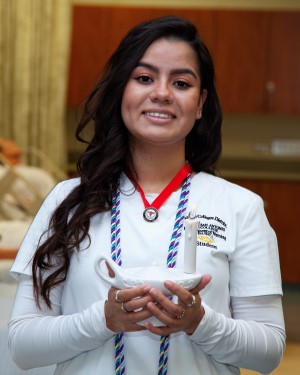SAC nursing student graduates at age 19, begins career as RN
January 9, 2023
After graduating from the San Antonio College nursing program last semester with an associate degree, Maria de Jesus Martinez Godinez is now about to become certified as a registered nurse, a career with a starting salary of around $60,000 per year.
It’s a great start on a rewarding profession, especially considering that Godinez turned 20 just after graduating.
 Godinez took a fast track to a nursing career by attending the Health Professions Academy during her junior and senior years of high school. At 17, she successfully graduated from high school with nursing prerequisites completed and automatic acceptance into SAC’s competitive nursing program.
Godinez took a fast track to a nursing career by attending the Health Professions Academy during her junior and senior years of high school. At 17, she successfully graduated from high school with nursing prerequisites completed and automatic acceptance into SAC’s competitive nursing program.
Godinez took one of several available high school pathways into a high-demand, well-paying career. In addition to Alamo Academies, Travis Early College High School and the new Imelda Davis Early College High School, both at SAC, also offer prerequisites in nursing and other fields to prepare high school students for careers in the area’s most needed industries.
By taking advantage of career-specific training opportunities starting in high school, students can get free career training while minimizing student debt, resulting in more trained professionals filling much-needed roles in the workforce.
“It’s going to help a lot of people. It’s going to help the community, the families of students, it’s going to help everyone all around,” said Eve Rodriguez, director of SAC’s nursing bridge program.
Godinez’s journey to a nursing career began as a junior at San Antonio’s East Central High School. Her parents would drop her off at the school at 6 a.m. so she could take a bus to SAC to take pre-nursing courses through the Health Professions Academy. She and her classmates in the program would then take a bus back to East Central to finish their high school day.
When she began at SAC in Fall 2020, Godinez found college daunting. Many of her college classmates were older, with children of their own. Godinez, a first-generation college student who moved to the United States from Mexico when she was 10 years old, was very soft-spoken and kept to herself, recalls Rodriguez, one of her first-level professors.
That changed as she advanced through the program and drew support from her classmates.
“Now she initiates conversations, she identifies problems where she works and tells the nurse manager about them,” Rodriguez said. “It’s amazing to see the growth I’ve seen in her. Now there are so many things she wants to do. There’s a whole bunch of opportunities for her, which is great that she’s seeing it and she’s seeking it.”
As a SAC student, Godinez attended a job fair on campus and began working as an entry-level nursing assistant at a local hospital, giving her hands-on experience while continuing her nursing studies.
“I see a lot of potential to grow with nursing,” she said. “It’s very flexible and you can do a lot of things with that degree. I plan to keep on continuing my education.”
Her next step is to earn a bachelor’s degree in nursing at SAC while she works as an RN. SAC recently began offering the RN to BSN program, the first-ever bachelor’s degree available at the college. SAC developed the program to support community demand and increase the quality of care that graduates provide. Research shows that bachelors-prepared nurses provide better outcomes for patients.
Godinez admits it was a lot of hard work, but she is committed to what she feels isn’t a job but a true calling. She advises high school students considering taking the same path to nursing to stay with it.
“I would tell them that it is really hard, there’s a lot of things you have to sacrifice, there’s going to be moments where you’re going to doubt yourself and think that you’re not going to do it, but it’s not impossible,” she said. “You’ve got to keep working hard, pushing, studying. Remember why you started and what called you into becoming a nurse and taking care of patients who are in their most vulnerable position.”
-SAC-
